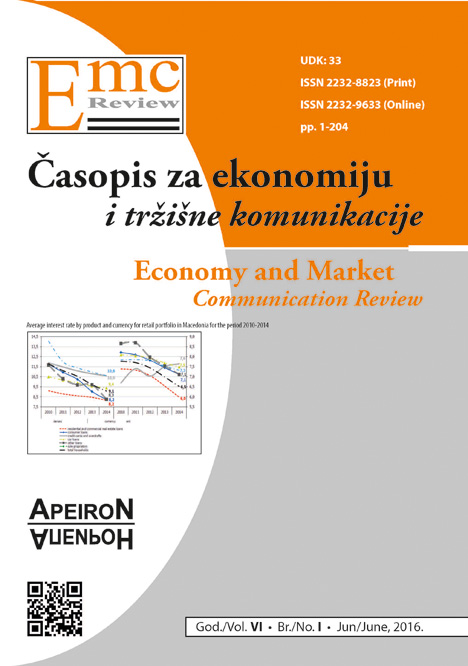RAZVOJNA POLITIKA I OCENA INVESTICIONIH PROJEKATA U MSP SRBIJE / DEVELOPMENT POLICY AND EVALUATION OF INVESTMENT PROJECTS OF SMALL AND MEDIUM ENTERPRISES IN SERBIA
DOI:
https://doi.org/10.7251/EMC16130LAbstract
Ensuring a favorable investment environment represents a very complex aspect of the development economic policy which entails a solid legislative framework, efficient and fair justice system, minimal administrative obstacles for investments, solid physical infrastructure, skilled and qualified workforce etc. Investment policy of the enterprise defines specific programs which accomplish the development goals. Basic principles, which represent the foundation for the development policy, are coordination with the major enterprise goals and absolute consistency with the development policy. Consequences of investment failures have impact not only on the enterprise, but also on the wider area or field of operations. Problems of rational investing, or efficient planning and realization of appropriate investment projects are categorized as key issues in the development of every enterprise. Small and medium enterprises in Serbia face low-liquidity levels and lack of their own investment resources for development and investment projects.Regardless of the choice complexity and frequent inability to evaluate and compare investments quickly, investment decisions are often based on intuition and empirical facts, rather than precise calculations. The exact scientific approach is indispensable, particularly in complex situations dominated by numerous conditioning factors, without disregarding the fact that following all estimates and evaluations, the choice and investment decision is made by the human taking into consideration immeasurable factors not included in the estimates, which however, effect the choice and investment decision. Investment decisions in our enterprises are still very often based on intuition and empiricism, while extensive research and investment argumentation is carried out only after decisions are made with the aim to obtain financial resources.Consequences of irrational and failed investments are enormous and immense. Their effect is not only limited to the company and all related organizations, but it also extends wider, frequently to the whole field in which the company operates. The greatest negative consequences of irrational investing are reflected in underdevelopment, and since they are not too clear and visible very little attention is payed to them. Over time, these consequences lead to absence of positive results, stagnation and losses, as well as gradual slowing down of the company, relative to other competitive enterprises, as well as stagnation in technological development and inability to effect its own development within required time frames.This is the reason why investment project are carried out with high interest rates of borrowed funds, mainly high interest loans with short-term returns. This kind of situation requires additional precautions in evaluating feasibility of investment projects, since investment failures carry major negative consequences both for the enterprise, and the area or field of operations.Downloads
Published
2016-12-15
Issue
Section
Чланци
